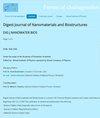溶胶-凝胶法制备TiO2/CO3O4核/壳纳米粒子的电学性质
IF 1
4区 材料科学
Q4 MATERIALS SCIENCE, MULTIDISCIPLINARY
Digest Journal of Nanomaterials and Biostructures
Pub Date : 2023-04-20
DOI:10.15251/djnb.2023.181.403
引用次数: 0
摘要
采用溶胶-凝胶法分两步成功合成了TiO2/Co3O4核壳纳米粒子:第一步是Co3O4纳米粒子的溶胶-凝胶合成,第二步是TiO2/Co3 O4纳米粒子的合成。利用X射线衍射、扫描电子显微镜、傅立叶变换红外光谱、漫反射光谱和电导率测量对所获得的Co3O4和TiO2/Co3O4核壳纳米颗粒进行了研究。X射线衍射分析表明,在TiO2/Co3O4核壳纳米颗粒中同时存在Co3O4和TiO2相;co3o4纳米颗粒具有立方体形状,并且TiO2纳米颗粒具有四方形状。Co3O4纳米颗粒的SEM图像显示,大多数颗粒均匀分布,具有单独的边界,TiO2/Co3O4纳米粒子的图像显示,随着煅烧温度的升高,核壳纳米颗粒的尺寸也增加。FTIR光谱证实了Co3O4和TiO2/Co3O4纳米材料的合成。漫反射光谱表明,TiO2/Co3O4核壳纳米粒子的带隙随着温度的升高而减小。TiO2/Co3O4核壳纳米材料的电导率随着温度的升高以及频率的增加而增加。本文章由计算机程序翻译,如有差异,请以英文原文为准。
Electrical properties of TiO2/CO3O4 core/shell nanoparticles synthesized by sol-gel method
TiO2/Co3O4 core-shell nanoparticles were successfully synthesized by the sol-gel method in two steps: the first step is the sol-gel synthesis of Co3O4 nanoparticles, and the second step is the synthesis of TiO2/Co3O4 nanoparticles by sol-gel method. The obtained Co3O4 and TiO2/Co3O4 core-shell nanoparticles were investigated utilizing X-ray diffraction, scanning electron microscopy, Fourier transforms infrared spectroscopy, diffuse reflectance spectroscopy, and conductivity measurement. X-ray diffraction analysis showed the presence of both Co3O4 and TiO2 phases in TiO2/Co3O4 core-shell nanoparticles; co3o4 nanoparticles have a cubic shape, and TiO2 nanoparticles have a tetragonal shape. SEM images of Co3O4 nanoparticles show most of the particles are smoothly distributed, having separate boundaries, and images of TiO2/Co3O4 nanoparticles showed that with an increase in calcination temperature, the size of the core-shell nanoparticles also increases. FTIR spectrum of both confirms the synthesis of Co3O4 and TiO2/Co3O4 nanomaterials. Diffuse reflectance spectroscopy exhibited the band gaps of TiO2/Co3O4 core-shell nanoparticles decrease with the increase of the temperature. The conductivity of the TiO2/Co3O4 core-shell nanomaterials increases with an increase in temperature and also with an increase in frequency.
求助全文
通过发布文献求助,成功后即可免费获取论文全文。
去求助
来源期刊

Digest Journal of Nanomaterials and Biostructures
工程技术-材料科学:综合
CiteScore
1.50
自引率
22.20%
发文量
116
审稿时长
4.3 months
期刊介绍:
Under the aegis of the Academy of Romanian Scientists
Edited by: -Virtual Institute of Physics operated by Virtual Company of Physics.
 求助内容:
求助内容: 应助结果提醒方式:
应助结果提醒方式:


